The Next Page
Are you curious about the power of international cooperation? And how it affects our future? Tune in to the #NextPagePod, the podcast of the UN Library & Archives Geneva, designed to advance the conversation on multilateralism.
Are you curious about the power of international cooperation? And how it affects our future? Tune in to the #NextPagePod, the podcast of the UN Library & Archives Geneva, designed to advance the conversation on multilateralism.
Episodes
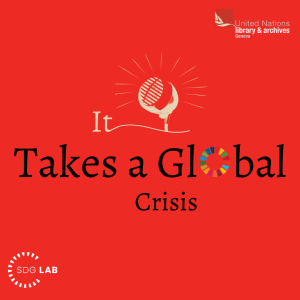
Friday Jan 07, 2022
Friday Jan 07, 2022
Welcome to Episode 1 of 'It Takes a Global Crisis', a series of four special episodes produced by the UN Library & Archives Geneva in collaboration with the SDG Lab.
In this episode on digitalization and connectivity, we're joined by Doreen Bogdan-Martin, Director of the ITU Telecommunication Development Bureau (BDT) and Ibrahima Guimba-Saïdou, the Minister Special Advisor to President of Niger and CEO of the National Agency for Information Society (ANSI). Together, they explore the impact of COVID-19 on connectivity and digitalization across the world, and whether progress to achieve the Sustainable Development Goals has been accelerated or disadvantaged through the pandemic.
So, did it take a global crisis to advance digitization and connectivity? Let's find out.
Note: This podcast, recorded on 6 October 2021, mentions 3.7 billion people, or 51% of the world’s population, remain unconnected to the Internet (Source: ITU Facts and Figures 2020). In December 2021, ITU's latest Facts and Figures 2021 report revealed that the estimated number of people who have used the Internet has surged to 4.9 billion in 2021 (63%), from an estimated 4.1 billion in 2019. However, in 2021, an estimated 37 per cent of the world's population – or 2.9 billion people – have still never used the Internet.
Resources
Transcript: The Next Page - Transcripts - Audio Guide - Research Guides at United Nations Library & Archives Geneva (unog.ch)
Find out more about Doreen Bogdan-Martin, Director of the Telecommunication Development Bureau of the ITU: Click here.
Find out more about Ibrahima Guimba-Saïdou, Minister Special Advisor to President of Niger and CEO of National Agency for Information Society (ANSI): Click here.
Find out more about the 'Building Smart Villages: A Blueprint – as Piloted in Niger': Click here.
Sustainable Development Goals: THE 17 GOALS | Sustainable Development (un.org)
The 2030 Agenda: The Sustainable Development Agenda - United Nations Sustainable Development
Where to listen to this episode
Apple podcasts: https://podcasts.apple.com/us/podcast/the-next-page/id1469021154
Spotify: https://open.spotify.com/show/10fp8ROoVdve0el88KyFLy
Youtube: https://youtu.be/wUdt7ziY0V0
UN Library & Archives
Facebook: https://www.facebook.com/UNOGLibrary
Twitter: https://twitter.com/UNOGLibrary
SDG Lab
Twitter: https://twitter.com/SDGLab
LinkedIn: https://www.linkedin.com/company/sdg-lab/
SDG Lab website: About SDG Lab — SDG Lab
Content
Speakers: Doreen Bogdan-Martin and Ibrahima Guimba-Saïdou
Host: Edward Mishaud
Editor: Tiffany Verga
Social Media: Tiffany Verga & Marlène Borlant
Production: Natalie Alexander, Edward Mishaud, Marlène Borlant, Evgeniya Altukhova & Tiffany Verga
Recorded & produced at the United Nations Library & Archives Geneva in collaboration with the SDG Lab.
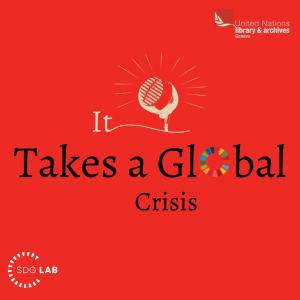
Monday Dec 20, 2021
It Takes a Global Crisis: Episode 0 - Introduction
Monday Dec 20, 2021
Monday Dec 20, 2021
Did it take a global crisis like the COVID-19 pandemic for us to see the challenges to reaching Agenda 2030? To set in motion solutions for sustainable development for all? Welcome to 'It Takes a Global Crisis', a series of four special episodes produced by the UN Library & Archives Geneva in collaboration with the SDG Lab.
In this introductory episode, we're joined by Nadia Isler, Director of the SDG Lab and Francesco Pisano, the Director of the Library & Archives, to explore how the COVID-19 pandemic has in many ways accelerated sustainable development solutions, but also highlighted the challenges, gaps, and limitations of progress.
Throughout the series, we'll be talking to a range of experts and practitioners--as they work both on the ground and in advancing policy--about their experiences across the themes of digitalization and connectivity, the environment as a key to social resilience, social protection and sustainable cities.
So, did it take a global crisis?
Join us for the first episode on 7 January 2022 to find out.
Resources
SDG Lab website: About SDG Lab — SDG Lab
Find out more about Nadia Isler, Director of the SDG Lab: Nadia Isler
Find out more about Francesco Pisano, Director of the Library & Archives: Francesco Pisano - MEIG Programme
Sustainable Development Goals: THE 17 GOALS | Sustainable Development (un.org)
The 2030 Agenda: The Sustainable Development Agenda - United Nations Sustainable Development
Transcript: https://libraryresources.unog.ch/c.php?g=673332&p=4880979&t=18980
Where to listen to this episode
Apple podcasts: https://podcasts.apple.com/us/podcast/the-next-page/id1469021154
Spotify: https://open.spotify.com/show/10fp8ROoVdve0el88KyFLy
Podbean: https://unitednationslibrarygeneva.podbean.com/
YouTube: https://www.youtube.com/watch?v=8f2QYzMy3C0
UN Library & Archives
Facebook: https://www.facebook.com/UNOGLibrary
Twitter: https://twitter.com/UNOGLibrary
SDG Lab
Twitter: https://twitter.com/SDGLab
LinkedIn: https://www.linkedin.com/company/sdg-lab/
Content
Speakers: Nadia Isler and Francesco Pisano
Hosts: Natalie Alexander and Edward Mishaud
Editor: Tiffany Verga
Social Media: Tiffany Verga & Marlène Borlant
Production: Natalie Alexander, Edward Mishaud, Marlène Borlant, Evgeniya Altukhova & Tiffany Verga
Recorded & produced at the United Nations Library & Archives Geneva in collaboration with the SDG Lab.
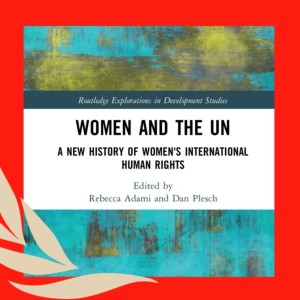
Friday Dec 10, 2021
Friday Dec 10, 2021
This episode brings us on a journey of archaeology. Not the type with shovels and brushes, but rather a restorative archaeology that sheds light on the stories of women who are not well known in the history books.
We speak with Fatima Sator, Ellen Chesler and Dan Plesch, two of the authors and the co-editor of a new book published this year called Women and the UN: A New History of Women’s International Human Rights. It documents the stories of influential women, many from the global south, who dedicated their work to ensuring women’s human rights were recorded in UN conventions, treaties and documents. Despite this work, there is very little known about them and their contribution.
Fatima Sator is a communications specialist at International Committee of the Red Cross, author and gender equality researcher at School of Oriental and African Studies University of London, or SOAS.
Ellen Chesler is an author and Senior Fellow at CUNY's Ralph Bunche Institute for International Studies. They both contributed chapters to the book.
Dan Plesch is a co-editor of this volume, together with Rebecca Adami. He is the Director of the Centre for International Studies and Diplomacy at SOAS.
We talk about why documenting these stories of women in our history matters for our understanding of multilateralism, and consider how we define multilateralism might to evolve to fully comprehend the contribution of women to key multilateral decisions and documents that exist today.
Episode Transcript
Access the transcript here.
Open Access Book
“Women and the UN: A New History of Women’s International Human Rights” - Open Access version online: https://www.taylorfrancis.com/books/oa-edit/10.4324/9781003036708/women-un-rebecca-adami-dan-plesch
Book Resources
Project Page for Women and the UN: https://www.soas.ac.uk/cisd/research/women-in-diplomacy/women-in-the-un-charter/
Open Global Rights article on the book: https://www.openglobalrights.org/women-and-the-un-a-new-history-of-womens-international-human-rights/?lang=English
TEDx PlaceDesNations talk with Fatima Sator and Elise Diettrichson - "These women changed your life": These Women Changed Your Life | Elise Luhr Dietrichson & Fatima Sator | TEDxPlaceDesNationsWomen
"Women founders of the UN" - SOAS conference with Rebecca Adami
Women and Girls Rising: Progress and resistance around the world, edited by Ellen Chesler and Terry McGovern: https://www.taylorfrancis.com/books/edit/10.4324/9781315708379/women-girls-rising-ellen-chesler-terry-mcgovern
Content
Speakers: Ellen Chesler, Fatima Sator and Dan Plesch
Host: Natalie Alexander
Editor & Producer: Natalie Alexander
Social media designs: Natalie Alexander
Recorded & produced at the United Nations Library & Archives Geneva

Friday Nov 26, 2021
Forging a Seat at the Table for Youth at COP with Holly Crockford
Friday Nov 26, 2021
Friday Nov 26, 2021
As thousands of people ascended into Glasgow to attend COP26, young people fought to have their voices heard. But beyond COP, how do we ensure youth have a seat at the climate table not just now but always?
For the month of November, #NextPagePod has gone green in support of COP26. So far we've featured conversations exploring climate issues, youth activism, the science behind the policy and of course talked about what role multilateralism plays in the future of our planet. In this final episode, we are going back to what inspired this series in the first place, COP26, as we talk to one of the young Australian delegates on the final day of the conference.
In this episode, we talk to Holly Crockford to hear what she has learned on the ground from a youth perspective but also what she hopes to see after the conference ends. Holly is a young Australian climate leader who is the co-founder of Climate Force and Foundations for Tomorrow an organization powered by the Global Shapers Community, she is also involved with AYFICE (Australian Youth For International Climate Engagement) and has a background in pro-bono law and community volunteering. In this conversation we explore youth accessibility to the conference, what actions Holly wants to see beyond COP and the type of climate leadership she'd like to see.
Resources:
Find out more about Holly: Holly Crockford — QUT Law Society
Connect with Holly: https://www.linkedin.com/in/holly-j-crockford-364003138/
ClimateForce website: https://www.theclimateforce.org/
Connect with AYFICE:
YouTube: https://www.youtube.com/channel/UCBLTAoW_y2F2z5zd2WJHVsA
Facebook: Australian Youth for International Climate Engagement (AYFICE) Network (facebook.com)
LinkedIn: https://www.linkedin.com/groups/12489212/
Find out more about the Global Shapers Community: https://www.globalshapers.org/
What platforms to find us on:
Apple podcasts: https://podcasts.apple.com/us/podcast/the-next-page/id1469021154
Spotify: https://open.spotify.com/show/10fp8ROoVdve0el88KyFLy
Podbean: https://unitednationslibrarygeneva.podbean.com/
Follow us:
https://www.facebook.com/UNOGLibrary
https://twitter.com/UNOGLibrary
Content:
Speakers: Holly Crockford & Tiffany Verga
Host: Tiffany Verga
Editor & Producer: Tiffany Verga
Social media designs: Tiffany Verga
Recorded & produced at the United Nations Library & Archives Geneva
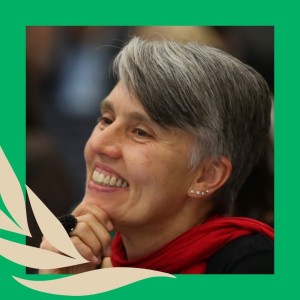
Friday Nov 19, 2021
When Climate Science Meets Policy with Dr Debra Roberts
Friday Nov 19, 2021
Friday Nov 19, 2021
With policymakers needing scientific evidence to guide their decisions on topics such as public health and the climate, how do we ensure science makes its way into policy?
For the month of November, #NextPagePod is going green in support of COP26. We will feature conversations exploring climate issues, youth activism, explore the science behind the policy and of course talk about what role multilateralism plays in the future of our planet.
In this episode, we speak to Dr Debra Roberts about the intersection of science and policy, the bridge builders helping open the communication lines between both worlds and what the future of science multilateralism will hopefully look like.
Dr Roberts is currently the Head of the Sustainable and Resilient City Initiatives Unit in the eThekwini Municipality in Durban, and prior to this post she established the Environmental Planning and Climate Protection Department in eThekwini and was selected as the first Chief Resilience Officer in 2013.
She was also involved in both the fifth and sixth assessment of the IPCC report has led the Chapter 8 (Urban Areas) section and contributed to Chapter 12 (Africa) on the fifth assessment report. For the sixth assessment report, she became the Co-Chair of Working Group 2 and her team is looking to release their report next year. She also brings to this discussion several years of negotiating experience having sat on various international advisory boards advising on climate issues.
Resources:
Transcript: The Next Page - Transcripts - Audio Guide - Research Guides at United Nations Library & Archives Geneva (unog.ch)
Find out more about Debra: https://www.ipcc.ch/people/debra-roberts/
Visit the IPCC website: IPCC — Intergovernmental Panel on Climate Change
View the latest IPCC report: AR6 Synthesis Report: Climate Change 2022 — IPCC
AR5 Synthesis Assessment IPCC report: AR5 Synthesis Report: Climate Change 2014 — IPCC
The eThekwini Sustainable and Resilient City Initiatives Unit: Durban’s Resilience Strategy
What platforms to find us on:
Apple podcasts: https://podcasts.apple.com/us/podcast/the-next-page/id1469021154
Spotify: https://open.spotify.com/show/10fp8ROoVdve0el88KyFLy
Podbean: https://unitednationslibrarygeneva.podbean.com/
Follow us:
https://www.facebook.com/UNOGLibrary
https://twitter.com/UNOGLibrary
Content:
Speakers: Dr Debra Roberts & Tiffany verga
Host: Tiffany Verga
Editor & Producer: Tiffany Verga
Social media designs: Tiffany Verga
Recorded & produced at the United Nations Library & Archives Geneva

Friday Nov 12, 2021
Youth Action for the Future of Water with Garvita Gulhati
Friday Nov 12, 2021
Friday Nov 12, 2021
For the month of November, #NextPagePod is going green in support of COP26. We will feature conversations exploring climate issues, youth activism, explore the science behind the policy and of course talk about what role multilateralism plays in the future of our planet.
In this episode, we invite you to ask yourself what water means to you and what role it plays in your everyday life. How does our relationship with water impact our communities and our future?
In this episode, we are joined by Garvita Gulhati an Indian environmentalist, Forbes 30 under 30 Asia member and founder of 'Why Waste?', an organization that aims to change people's mindsets towards the water after experiencing the devastating impacts of water shortage in her community in India. Today, 'Why Waste?' is India's largest youth-led organization working towards the conservation of water.
Resources:
Find our more about Why Waste? www.whywaste.io
Download the Why Waste? app: app.whywaste.io
Read the book online: https://storyweaver.org.in/publishers/4116-why-waste
Learn more about the We The Change Now campaign: wethechangenow.com.
What platforms to find us on:
Apple podcasts: https://podcasts.apple.com/us/podcast/the-next-page/id1469021154
Spotify: https://open.spotify.com/show/10fp8ROoVdve0el88KyFLy
Podbean: https://unitednationslibrarygeneva.podbean.com/
Follow us:
https://www.facebook.com/UNOGLibrary
https://twitter.com/UNOGLibrary
Content:
Speakers: Garvita Gulhati & Natalie Alexander
Host: Natalie Alexander
Editor & Producer: Tiffany Verga
Social media designs: Tiffany Verga
Recorded & produced at the United Nations Library & Archives Geneva
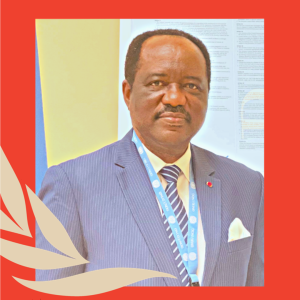
Friday Oct 29, 2021
Friday Oct 29, 2021
Nous sommes heureux d’accueillir pour cet épisode l’Ambassadeur et Représentant de la Mission permanente de la République du Cameroun auprès de l'Office des Nations Unies et des autres organisations internationales à Genève, Monsieur Salomon EHETH. Il est rejoint par notre Directeur, Francesco Pisano, dans le studio pour une conversation fascinante sur l’histoire de son pays et la place actuelle du Cameroun dans le contexte politique et stratégique en Afrique. Il partage aussi ses réflexions sur le rôle du Cameroun et le continent africain dans le multilatéralisme d’aujourd’hui et de demain.
Nous espérons que vous apprécierez cet épisode, bonne écoute !
Ressources :
Ambassador Salomon Eheth: https://bit.ly/3mkBT0d
Transcription: https://libraryresources.unog.ch/c.php?g=673332&p=4880979&t=18512
Contenu :
Intervenant: Francesco Pisano
Animatrice: Kelly Le Normand
Réalisation et montage: Kelly Le Normand, Natalie Alexander, Katrine Lyngso & Tiffany Verga
Enregistré et produit à la Bibliothèque des Nations Unies à Genève
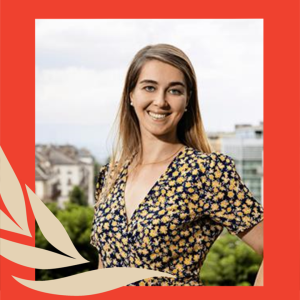
Friday Oct 15, 2021
The Rising Role of Youth in Multilateralism with Maria Isabelle Wieser
Friday Oct 15, 2021
Friday Oct 15, 2021
How should the UN involve and include young people in multilateralism? How can young people benefit from mentorship? And, are youth content with the pace of global governance? In this episode, Maria Isabelle Wieser, the former Deputy Director of Foraus and former Head of the Think Tank Hub joined the #NextPagePod for a discussion about the role of youth in multilateralism, barriers to diversity for young voices and how to best meaningfully engage youth in the decisions of today. Foraus is a Swiss think tank that advocates for constructive foreign policy and informative dialogue. They provide a platform for young people to access and contribute to a foreign policy outside of the current political party system and publish scientific-based policy recommendations. Currently, there are over 120 volunteers across 12 different thematic groups and 9 regional groups with the two central hubs located in Geneva and Zurich. In discussion with the Director of the UN Library & Archives Geneva, Francesco Pisano, Maria Isabelle explores her experiences navigating the foreign policy scene in Geneva from being bombarded by meetings in her first year to managing a young team throughout a pandemic. She also discusses the current limitations for young people to access international organizations and what needs to be done to best engage young people beyond surface-level meetings.
Resources:
More about Maria Isabelle Wieser:
Maria Isabelle Wieser – Foraus
Making Gender Work: The International Dimensions of Labour Market Inequality in Switzerland Making Gender Work (foraus.ch)
Where to find Foraus:
More about Foraus: Foraus – foraus
Facebook : @forausthinktank / @ThinkTankHubGeneva
Twitter : @foraus / @ThinkTankHub_CH
LinkedIn : Foraus - Swiss forum on foreign policy
Transcript: click here
Listen to us also on:
Apple podcasts: https://podcasts.apple.com/us/podcast/the-next-page/id1469021154
Spotify: https://open.spotify.com/show/10fp8ROoVdve0el88KyFLy
Podbean: https://unitednationslibrarygeneva.podbean.com/
Follow us:
https://www.facebook.com/UNOGLibrary
https://twitter.com/UNOGLibrary
Content:
Speakers: Maria Isabelle Wieser & Francesco Pisano
Host: Tiffany Verga
Editor & Producer: Tiffany Verga
Social media designs: Tiffany Verga
Recorded & produced at the United Nations Library & Archives Geneva
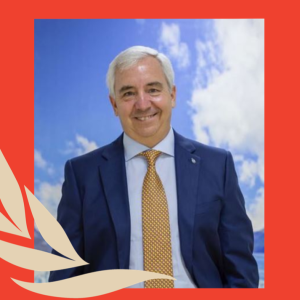
Friday Oct 01, 2021
Friday Oct 01, 2021
How did Argentina’s multicultural society shape how they approach multilateralism? And how did Argentina contribute to the human rights law we know today?
In this episode, Ambassador Federico Villegas, the Permanent Representative of Argentina to the United Nations Office at Geneva joined the #NextPagePod for a discussion around the history of Argentina and how diversity has shaped the country today.
Before being appointed to Geneva, Mr. Villegas has had an expansive career in foreign services as a career diplomat and lawyer. Appointed as the Argentinian Ambassador to Mozambique in 2016, he was then appointed as the Director-General of Human Rights at the Ministry of Foreign Affairs of Argentina from 2012 to 2016 and as a Representative to the Southern Common Market in Uruguay from 2008 to 2011.
In discussion with Director of the UN Library & Archives Geneva, Francesco Pisano, Mr. Villegas talks about his experience as a UN Disarmament fellow, Argentina’s relations with neighbouring America and how immigration in Argentina created a turning point for society. He also talked about military coups, and how periods in the country’s history led to a new human rights wave dedicated to the enforced disappearances of persons.
Resources:
More about Ambassador Villegas:
https://unctad.org/node/33987
Transcript: click here
Listen to us also on:
Apple podcasts: https://podcasts.apple.com/us/podcast/the-next-page/id1469021154
Spotify: https://open.spotify.com/show/10fp8ROoVdve0el88KyFLy
Podbean: https://unitednationslibrarygeneva.podbean.com/
Follow us:
https://www.facebook.com/UNOGLibrary
https://twitter.com/UNOGLibrary
Content:
Speakers: Ambassador Federico Villegas & Francesco Pisano
Host: Tiffany Verga
Editor & Producer: Tiffany Verga
Social media designs: Tiffany Verga
Recorded & produced at the United Nations Library & Archives Geneva
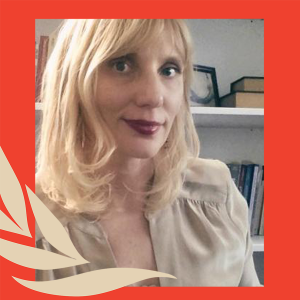
Friday Sep 17, 2021
Media, Truth and Power at the League of Nations with Carolyn Biltoft
Friday Sep 17, 2021
Friday Sep 17, 2021
In this episode, Professor Carolyn Biltoft considers how you do global intellectual history and the need for analysis, as she talks about her book, A Violent Peace: Media, Truth and Power at the League of Nations (2021, University of Chicago Press).
Looking through the League of Nations, a longed-for project of international peace and cooperation, Biltoft is interested in examining what is this thing called mass media. In her critique of the information system, she looks at how it transforms our relation to power and interacts with our fears, anxieties, and our longing for certainty.
We talk about language, money and the press and uncover stories from the time of the League of Nations about Esperanto, typewriters, time-capsules, pneumatic tubes, money, counterfeiting, branding and advertising. We also talk about the tragedy of the suicide of Stefan Lux during the Assembly on 3 July 1936 to bring attention to the horrors occurring in Nazi Germany.
Carolyn Biltoft encourages us to hold open what we can never know, to be curious and to keep asking.
Resources:
Biltoft, C. N. (2021). A Violent Peace: Media, Truth and Power at the League of Nations. University of Chicago Press: https://press.uchicago.edu/ucp/books/book/chicago/V/bo80675830.html
Biltoft, C. N. (2020). The anatomy of credulity and incredulity: A hermeneutics of misinformation, Misinformation Review. Harvard Kennedy School. https://misinforeview.hks.harvard.edu/article/the-anatomy-of-credulity-and-incredulity-or-a-hermeneutics-of-misinformation/
More about professor Biltoft: https://www.graduateinstitute.ch/academic-departments/faculty/carolyn-biltoft
Transcript: here
Content:
Speakers: Amy Smith and Carolyn Biltoft
Host: Amy Smith
Editor & Producer: Katrine Lyngso and Amy Smith
Social media designs: Katrine Lyngso
Recorded & produced at the United Nations Library & Archives Geneva

The #NextPagePod
Are you curious about the power of international cooperation? And how it affects our future? Then tune in to the #NextPagePod, the podcast designed to advance the conversation on multilateralism!
Each episode delves into global issues through a multilateral lens, exploring how collaboration across disciplines can facilitate reaching common goals.
Produced at the United Nations Library & Archives Geneva
Editorial Team:
Editor & Coordinator - Amy Smith
Hosts: Francesco Pisano, Natalie Alexander, Amy Smith, Blandine Blukacz-Louisfert, Hermine Diebolt.
Podcast logo and designs - Natalie Alexander, Amy Smith.





